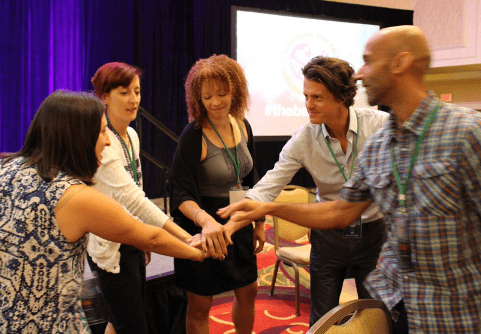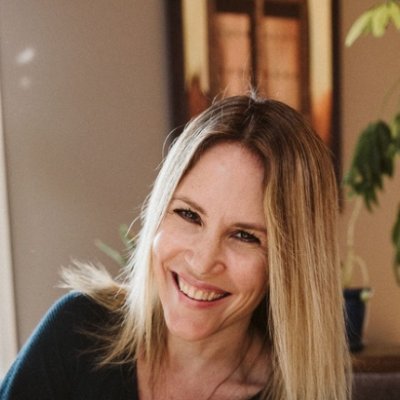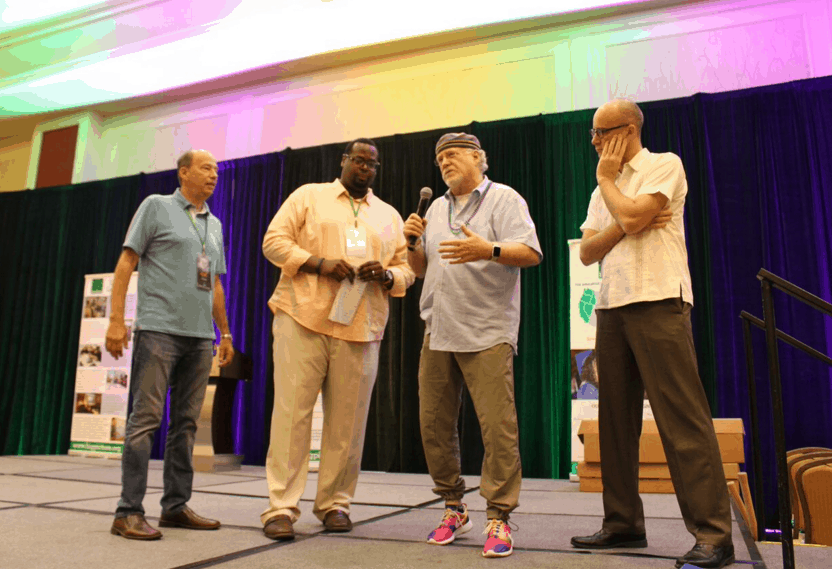4 Ways Big Picture Learning Prepares Leaders for Deeper Learning

What do semi-professional jugglers, adults dressed as Star Wars characters, a dance party at a college campus (but for people over age, let’s say, 30), and a PlayDoh sculpture contest all have in common?
They are all part of the intentional deeper learning–and “fun”–that I have experienced over the last ten years as I have participated in Big Picture Learning convenings.
The people that lead Big Picture Learning (BPL), as well as the larger network of school leaders, teachers and staff, know how to host a great learning festival.
The professional learning is hands on, immersive and engaging. There is a strong emphasis on being curious, using your hands, leading with your heart, having meaningful conversations and creating connections. This “professional learning through experiences” has been created and modeled by co-founders Dennis Littky and Elliot Washor, and is embodied now by intelligent, charming and affable co-executive directors Carlos Moreno and Andrew Frishman (whom we interviewed for one of our very-first podcasts, on student-centered learning).
From left: co-founder Elliot Washor, co-executive director Carlos Moreno,
co-founder Dennis Littky and co-executive director Andrew Frishman
Big Picture is hosting an upcoming leadership conference (#BPLeadership) in Denver this week which will be comprised of leaders from the Big Picture network as well as other schools, networks, and leaders engaged in deeper learning.
As we wrote in Preparing Teachers for Deeper Learning and Preparing Leaders for Deeper Learning, much of the teacher and leader preparation we advocate for encourages the creation of deeper learning environments for adults. We seek to create the same types of learning environments for adults that we also seek to create for students. Big Picture Learning embodies leading for deeper learning. In fact, no one models deeper learning more deeply at learning festivals (ok, conferences) than these folks.
Here’s how they do it. At BPL, leading towards deeper learning means:
Leaders set and convey a vision for deeper learning.
We interviewed Michael Soguero, director of professional development at Eagle Rock Professional Development Center and former BPL principal. He said, “[Leaders should] have a strong vision and articulate that in a clear, compelling way to staff. The leader should have the skills and competencies to buffer the staff from external distractions and be willing to take heat with district/staff demands. You should not use the state/district as an excuse for something that your staff should do. It’s important to find the sweet spot between having a framework and making sure there are some points of consensus.”
Leaders innovate and manage shifts to deeper learning.
Innovative leaders prioritize student-centered design and are always willing to go back to the drawing board to improve learner and educator experiences. They hack their way towards success and also own their failures. Failures they make are all part of striving for the innovations they are seeking and taking calculated risks may create more significant impact.
When we interviewed Jeff Petty, founder and director of the Puget Sound Consortium for School Innovation (PSCSI) and BPL regional coach, about breakthrough leadership and innovations in learning for principals and superintendents, he outlined specific mindsets and experiences to be nurtured and cultivated. He said that leaders should consider strategically and productively breaking the rules.
Jeff said, “The prevailing structure of rules is obviously not working well enough. School leaders making real equity breakthroughs have figured out how to innovate and push the systems they are in without getting fired. Emerging leaders need to be exposed to those very different approaches to school design (the innovations) as well as mentors who are skillful rulebreakers (the innovating), so they can develop this mindset. Instead of finding out what the rules are, the leaders we need are guided by a strong vision of what is best for kids.” (For more, listen to Jeff talk about his visit to the Deeper Learning conference on the Getting Smart Podcast here.)
Leaders lead for deeper learning outcomes.
Leaders are advocates for all students. They create healthy and authentic relationships with students, teachers and staff. They model how they do this for other adults in the building. They let students know they care.
This can be in keeping an open office door, asking students how they are doing each day, greeting students by name or having one on one meetings with individual students. (Read BPL Regional Director Javier Guzman’s blog about how students come first here.)
Leaders engage and scale deeper learning.
Leaders who scale deeper learning do so because they are able to cultivate other leaders. One way BPL cultivates leaders is through their work with innovative leaders from diverse backgrounds that are working in public education.
Check out BPL and International Network for Public School’s Deeper Learning Equity Fellows (#EquityFellows). They have accepted applications from dozens of leaders, and have chosen innovative social justice and mission-driven leaders from across the country who will be creating projects to create change in their communities, schools and organizations: “Deeper Learning Equity Fellows is a new 24-month cohort-based leadership program that aims to develop, strengthen, and sustain a group of diverse and exceptional leaders who will influence the policies and practices that expand access to Deeper Learning in public education across the country.”
What are the implications for your professional learning communities, your school or your organization? How do you prepare leaders for deeper learning? Check out Preparing Leaders for Deeper Learning and email [email protected] with the subject line “deeper learning” if you would like to be featured in an upcoming post about deeper learning leadership. Join in the conversation on Twitter: #deeperlearning.
For more, see:







0 Comments
Leave a Comment
Your email address will not be published. All fields are required.